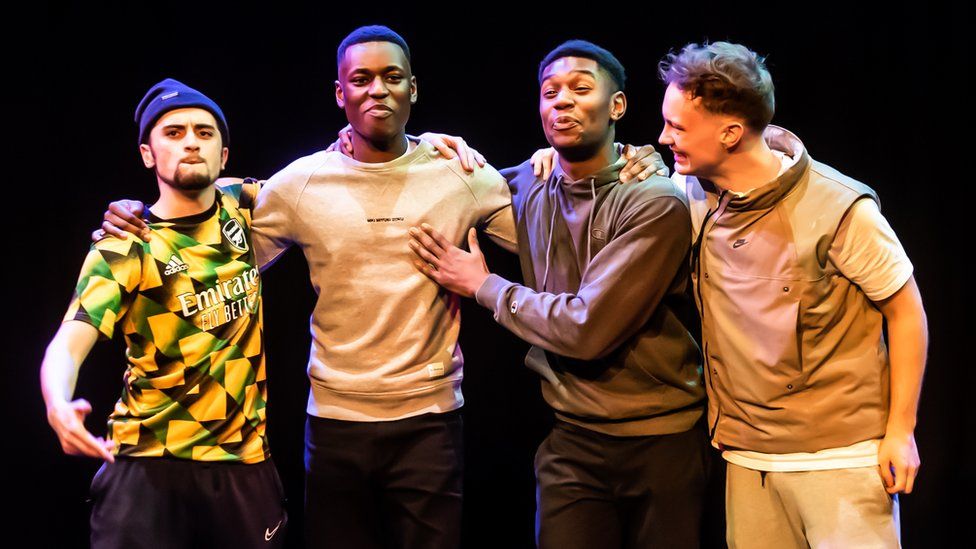
One Way Out features four actors in their first professional acting roles
By Nichola Rutherford
BBC Scotland News
When Montel Douglas scooped a £10,000 prize for his first play, he knew he was one step closer to staging it at the Edinburgh Fringe Festival.
Without it, his Peckham-based theatre group would have been unable to take their Windrush-inspired drama, One Way Out, to the prestigious arts showcase.
But the winnings didn’t even cover the full cost of basic accommodation for his four cast and three crew.
Without strong ticket sales, he now faces losing money on the show.
The sky-rocketing costs of performing at the Fringe – and the slim chance of breaking even – is one that is shared by many artists who have spoken to the BBC.
Image source, Getty Images
Thousands of performers have descended on Edinburgh for the annual Fringe festival
One Way Out, which tells the story of young British Caribbean people’s recent experience of the Windrush crisis, was one of three which won the £10,000 Untapped award earlier this year.
It was inspired by Douglas’s cousin, Dominique Cameron, who was deported to Jamaica in 2012, when she was 19, having lived in the UK since she was 10.
She received the letter raising questions about her documentation after she applied to university.
Douglas said it was important to share the little-known real world experiences of his working class community with the wider audience offered at Edinburgh.
“Without the prize money, I would not be here,” he said. “It’s really expensive but it’s a great place to be, so it’s a Catch 22.”
The cast and crew are staying in student accommodation but its cost of £10,700 immediately swallowed up their entire prize fund.
“So already I needed to find an extra £700 just to bring us up here,” Douglas said.
“That’s before props, that’s before any stage manager, lighting technician, the boys’ fee for the role. It’s been really, really difficult.”
Image source, Lidia Crisafulli
Shem Hamilton, Adam Seridji, Marcus Omoro and Sam Pote are making their first appearance in Edinburgh in One Way Out
In a bid to trim costs, he re-wrote the play to cut one part meaning he only had to bring four – rather than five – actors to Edinburgh.
He is trying raise an additional £7,000 by crowdfunding but it’s an uphill task and he knows family and friends do not have the resources to help.
“It’s not their fault but it’s upsetting to realise when you’re trying to champion a working class story and you realise your community can’t support you as much as you want. That’s really challenging.”
With tickets priced at between £8 and £12.50 for the show at Underbelly Cowgate, he estimates they need to sell an average of 35 a day to break even. They’re currently averaging 25.
“The people who do come and see the show enjoy it – I had a comment today saying it was probably the best thing they had seen at the Fringe – and that’s really rewarding to hear.
“But it doesn’t mean anything if we can’t get people in to see the show.”
Rachel Creeger says she uses the Fringe to hone her skill as a comedian
Rachel Creeger says she’s lucky to share a flat with two other comedians while she’s in Edinburgh.
Although she insists they have a good deal, the rent for her room is two-thirds of the monthly rent she pays for her entire family home in Hertfordshire.
She’s heard of others who are paying £7,000 for a standard two-bed flat for the month.
Her Ultimate Jewish Mother show is part of the Free Fringe, meaning she doesn’t have the added expense of hiring the performance space.
She said Free Fringe performers can also choose whether they want to spend their money on additional promotion like appearing in the brochure or putting up posters.
The audience can also choose whether to pay – and those who can are often generous, she says, but she also wants to ensure that local people on low incomes can enjoy the Fringe.
Comparing the festival to a trade fair, she says it gives her the opportunity to hone her craft.
“I imagine it’s like being an athlete, if you’re doing training in the build up to a final event… by the end of August that’s the funniest I’m ever going to be.”
Street performer Eddie Bond says crowds are smaller than in previous years
Eddie Bond, who is from Honolulu in Hawaii, performs at festivals around the world and travels to Edinburgh every year.
The street performer is currently staying with a friend 13 miles from the city, but he needs to find somewhere else to stay next week.
He normally stays in hostels but he says they are becoming increasingly expensive and they are all booked up.
He relies on donations from the crowds who watch his escape act on the street – but he says audiences have yet to recover to pre-pandemic levels.
“The crowds are smaller and costs are higher but it’s still a great place to be,” he said.
“2019 was humungous. I came in 2022 and it was 25% of what it normally was – fewer performers and fewer crowds.
“This year feels like the same as last year but with more performers.”



